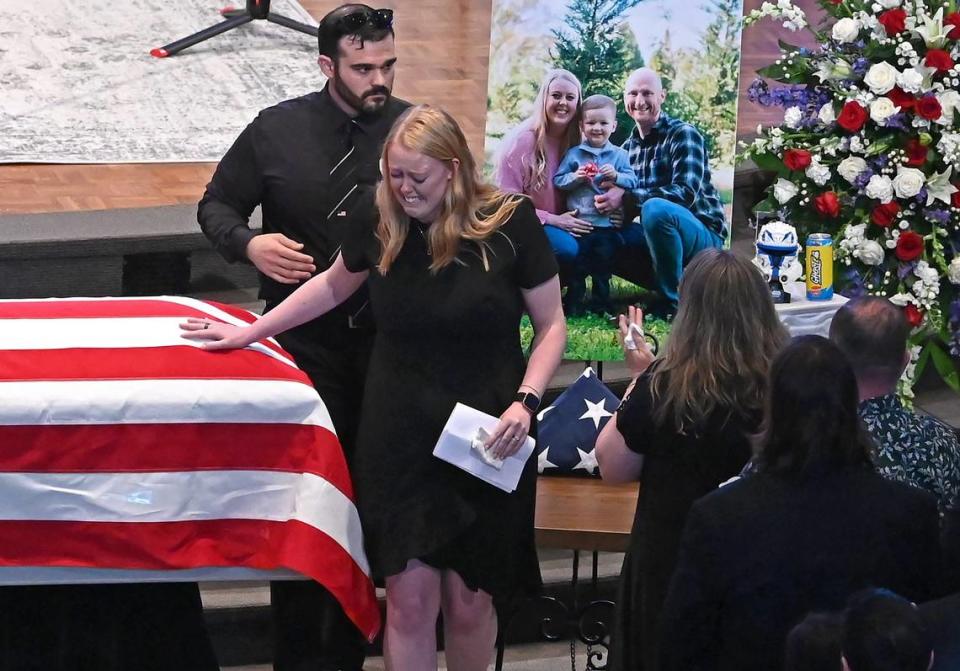Bucking national trend, killings in Charlotte are increasing. What’s to blame?
More people were killed from January through June of this year in Charlotte than in the first six months of any year since at least 2015.
Sixty-one people were killed in the first half of 2024, according to preliminary data from Charlotte-Mecklenburg Police. At least 50 victims were shot to death, most by handguns.
The only stretch of time in the past nine and a half years to outpace the start of 2024 was the second half of 2020, when 66 people were killed during a nationwide upswing in violence near the height of the COVID-19 pandemic.
The increase in homicides in Charlotte bucks a national trend, said Chandler Hall, senior policy analyst for gun violence prevention at the Center for American Progress, a Washington D.C.-based nonprofit.
Nationally, firearm-linked homicides dropped 13% in the first quarter of 2024 compared to the same period the year before, Hall said.
But homicides here have increased 33% so far this year, CMPD data show.
“It’s shocking to hear a city going so significantly in the opposite direction,” Hall said.
Looking for why
A number of factors could affect short-term trends, said Ernesto Lopez, senior research specialist with the Council on Criminal Justice. A particularly deadly month or a few incidents with multiple victims can lead to a spike in homicides for a city, he said.
Charlotte had both.
Charlotte had three incidents where three or more people were killed already this year.
A gunman killed four law enforcement officers April 29 after a U.S. Marshals Fugitive Task Force tried to serve an arrest warrant where he lived in east Charlotte. The shooter, Terry Clark Hughes, Jr., was also killed.

On Jan. 27, three people where shot and killed in south Charlotte, just west of South Boulevard. At the time, CMPD said the shooting started during a fight between two groups in a parking lot. Arguments, according to CMPD’s data, were behind about one-third of this year’s homicides.
On March 17, the bodies of a mother and her two children were found in north Charlotte near Interstate 85 and North Tryon Street. The suspect, Benjamin Taylor, 34, was arrested in California and extradited to North Carolina. He’s charged with three counts of murder and one count of concealment of death, according to CMPD.
There were 18 homicides in March, the most in any month since at least 2015, an Observer analysis found.
“Those sort of things will definitely impact short-term trends,” Lopez said of shootings where multiple people died. “You wouldn’t expect them to carry into the second half of the year or the following year.”
The Observer requested an interview with CMPD officials about the increase in killings, but the department did not respond. Nor did it answer written questions sent by email.
Some patterns stick
Like in previous years, victims of homicides in Charlotte in the first half of 2024 were most often Black men. Nearly all killings occurred in or around what’s called the city’s crescent, a string of mostly lower-wealth neighborhoods that stretch from east to west north of uptown.
According to the 2024 CMPD homicide data:
▪ 67% of the people killed were Black, 18% were Hispanic and 7% were white.
▪ 87% of the victims were male.
▪ The average age of victims was 30 years old. The youngest was less than a year while the oldest was 58, according to available data.
New way of seeing gun violence
The American Public Health Association now considers gun violence a major public health threat, one that is the leading cause of premature death in the United States.
Tracie Campbell, senior health manager for Mecklenburg County’s Office of Violence Prevention, sees it as a disease often caused by trauma such as abuse and neglect. She likened gun violence and homicides to the pandemic.
“One person gets COVID and they don’t know they have COVID... They go out and spread it,” Campbell said. “It’s the same thing as having unresolved trauma when you have no one to help you deal with it.”
The county created the office about four years ago to help treat that trauma, sometimes by referring those who have experienced violence to mental health services.
Campbell calls it a relationship-building program. The office partners with families, community leaders, churches, YMCAs and others to try to prevent violence, including intervening before it escalates.
C. Maria Macon, founder and executive director of Mecklenburg Council of Elders, said she agrees that untreated trauma is a main cause for Charlotte’s gun violence. The nonprofit group provides therapy to those affected by violence and helps people get their criminal records expunged.
She’s not surprised by the recent increase in homicides, she said.
“There is a great number of people with unaddressed trauma,” Macon said, adding that it ”may have happened when they were younger, but it manifests itself when they get to the age that they can flex their muscles. That anger is now flaring up.”

